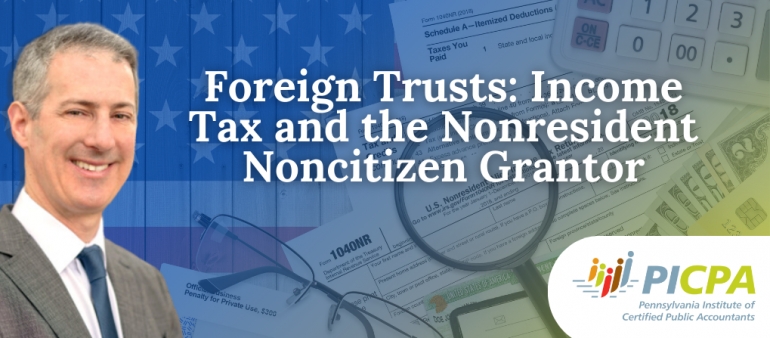Neither Internal Revenue Code (IRC) Section 684(a), Deemed Sales Provisions, nor Section 679, Deemed Grantor Status, generally apply to transfers by an NRNC to a foreign trust. (See my previous blog on the deemed sale rules.)
U.S. source income is generally treated for U.S. income tax purposes as earned by a foreign (nongrantor) trust.2 U.S. income of a foreign nongrantor trust consists only of income derived from sources within the United States (not effectively connected with the conduct of a U.S. business) and income effectively connected with the conduct of a U.S. business.3
Foreign nongrantor trusts are thus subject to U.S. income tax only on the following types of income:4
- Income effectively connected with a U.S. trade or business.
- Disposition of U.S. real property interests.
- Fixed or determinable annual or periodic income (FDAPI) from U.S. sources, such as interest, dividends, rents, annuities, etc.
U.S. Beneficiary
If an NRNC funds a foreign trust for the benefit of a U.S. person, the trust will be treated as either a foreign grantor trust or a foreign nongrantor trust for U.S. income tax purposes. To avoid having U.S. beneficiaries recognize taxable income earned by trust (and the tax on accumulated trust income), NRNCs may attempt to form the foreign trust as a foreign grantor trust (disregarded for U.S. income tax purposes). In such cases, the NRNC grantor is responsible for all U.S. source income recognized by the foreign trust.
Since 1996, NRNCs may establish grantor foreign trust status only by satisfying one of three exceptions to grantor status:5
- The grantor may revoke the trust without the consent of any person.
- The grantor or the grantor’s spouse is the sole beneficiary of the trust during the life of the grantor.
- The trust was created before Sept. 19, 1995 (regarding assets in trust as of such date), if the trust qualified as a grantor trust, pursuant to IRC Sections 676 or 677.
IRC Section 672(f) thus denies NRNC settlors grantor trust status for trusts formed after 1995 unless the grantor retains the right (exercisable either unilaterally or with the consent of a related or subordinate person) to revoke the trust or distributions from the trust (during the grantor’s life) are distributable only to the grantor or the grantor’s spouse. One strategy is for NRNCs to fund a foreign trust that limits distributions to husband and wife (grantors) and distribute foreign assets (received from the trust or otherwise) tax-free to a U.S. relative.6
Upon the death of the NRNC grantor, the offshore trust loses its grantor trust status. Trust income from U.S. sources is then recognized by the trust (an independent taxpayer).
Foreign Tax Credit
A foreign nongrantor trust engaged in a U.S. trade or business that pays foreign income tax on income effectively connected to the U.S. business may generally offset foreign tax incurred against U.S. income tax.7 Alternatively, the trust may potentially deduct from U.S. taxable income such taxes.8
Tax Rates
All U.S. source income earned by a foreign trust is subject to tax rates applicable to trusts under IRC Section 1(e). The rates are as follows:
| Taxable Income | Tax Due | |
| $0 - $2,600 | 10% of taxable income | |
| $2,601 - $9,300 | $260 + 24% of the amount over $2,600 | |
| $9,301 - $12,750 | $1,868 + 35% of the amount over $9,300 | |
| $12,751 + | $3,705.50 + 37% of the amount over $12,750 |
Tax Treaties
Applicable tax treaties may reduce U.S. income tax on foreign (nongrantor) trusts if the trust is resident of a treaty partner country. For example, most U.S. income tax treaties reduce the tax imposed on passive dividends from 30% to 15%.9
1 IRC Sections 641(b) and 872(a). See IRC Sections 642, 643, 651, and 661 regarding special rules for credits and deductions for trusts.
2 Unless IRC Section 672(f), Grantor Status, applies to the trust.
3 IRC Section 872(a).
4 IRC Sections 871(b), 897(a), and 871(a).
5 IRC Sections 672(f)(2)(A)(i) and 672(f)(2)(A)(ii); and Treas. Reg. Sections 1.672(f)-3(a)(3) and 1.672(f)-3(b)(3).
6 IRC Section 672(f)(2)(A)(ii).
7 IRC Sections 901(b)(4) and 906(a).
8 IRC Section 164(a)(3).
9 See Convention Between the United States of America and Canada with Respect to Taxes on Income and on Capital, Sept. 26, 1980, U.S.-Canada, T.I.A.S. (hereinafter “U.S.-Canada Income Tax Treaty”).



 Article Written for:
Article Written for: 

